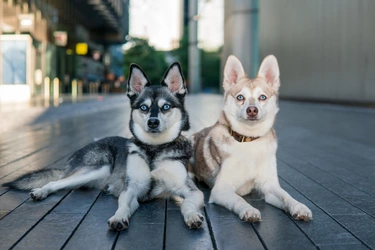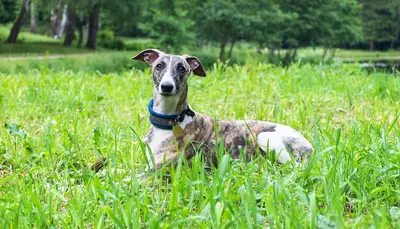Alaskan Klee Kai: Dog Breed Guide
- 10 Aug 2023
- 6m read

What is a Klee Kai?
Alaskan Klee Kai are a companion-sized dog breed that were created by Linda Spurlin in the 1970s. Spurlin was inspired to create the breed after she adopted a “mini husky” called Curious, from relatives in Oklahoma. When she returned to Alaska with her 17-pound grey and white Husky dog, Spurlin received an enthusiastic reaction to Curious from the locals. It prompted Spurlin to set about creating a companion-sized husky-type dog in the image of Curious.
Spurlin used four different types of dogs to create her initial Klee Kai: Alaskan Husky, Siberian Husky, Schipperke and American Eskimo Dog. The Alaskan Husky provided the cornerstone of her Klee Kai breed with traits such as endurance, speed and heart.
Initially, she didn’t make her Klee Kai available to the public. However, she finally released her Klee Kai into the world in 1988 after some convincing from friends.
Alaskan Klee Kai were granted status by the United Kennel Club in 1997, creating a breed standard for breeders to adhere to. They’ve also received full recognition from Federation Of International Canines, the American Rare Breed Association, Canine Rarity Shows and the Alaskan Klee Kai Association of America.
It’s important to note that you can only get an Alaskan Klee Kai by breeding two UKC-registered Alaskan Klee Kai. The AKKAOA list 59 breeders around the world who have signed up their code of ethics, including one breeder in the UK.
Why Choose Alaskan Klee Kai?
It’s easy to fall in love with Alaskan Klee Kai, given these miniature dogs have a striking appearance combined with big personalities. Whilst Alaskan Malamutes and Siberian Huskies are brilliant dogs, they require lots of space given their large size. The Klee Kai can make an excellent alternative for sled dog lovers who want an apartment-sized version of a husky.
Alaskan Klee Kai were bred to be companion dogs, so it’s no surprise that these dogs can thrive as family pets. They’ll develop a deep bond with their owners, although some Klee Kai will choose one family member who they’re particularly bonded with.
If you’re an active person, Klee Kai can happily slot into your daily routines, whether it’s long walks in the countryside, enjoying a 5km run, taking part in agility competitions or going for a swim.
Things to Know Before Getting an Alaskan Klee Kai
It’s easy to see why Alaskan Klee Kai are becoming increasingly popular around the world. These charismatic little dogs are a bite-size alternative to bigger northern breeds like Huskies and Malamutes.
However, there are a few things to consider before you get a Klee Kai.
Alaskan Klee Kai are highly intelligent with an independent streak. They’ll require regular training throughout their lives to ensure they’re well-behaved dogs who listen and follow commands.
Separation anxiety is a chronic canine condition that does appear to be pretty common amongst members of the Klee Kai breed. It usually occurs when dog owners are about to leave or have left the home.
As a relatively new dog breed that isn’t typically found in UK cities, prospective Klee Kai owners should be ready to answer lots of questions when out and about. Inevitably, you will be stopped on your daily walks to be quizzed about their breed, their size, their personalities and where can you get a Klee Kai. So you’ll need to have your Klee Kai facts prepared!
If you’ve got your heart set on an Alaskan Klee Kai, you should be careful when looking for a breeder. Sadly, there are a lot of scammers. The Alaskan Klee Kai Association of America’s website provides a list of breeders on their who have signed up to their code of ethics. Anyone who is thinking about getting a Klee Kai should consult this list.
Personalities
Alaskan Klee Kai are small dogs with big personalities.
They’re companion dogs who’ll thrive being around their fellow family members. Klee Kai can be skittish, especially around people they don’t know. It’s important to try to socialise your Klee Kai from a young age to ensure that they can build some social skills.
The AKK breed are alert and loyal so they can make excellent watchdogs, keeping an eye on the comings and goings in your home.
Klee Kai are smart dogs that require lots of mental and physical stimulation. Although they’ll enjoy daily walks and even running with their owners, Alaskan Klee Kai are just as happy playing some brain games or enrichment activities in the home or in the garden. They’re very adaptable.
These mini huskies have a high prey drive and make expert escape artists. They won’t require a second invitation to chase a small animal such as a rabbit or a squirrel. It’s a good idea to work on their recall from a young age with this trait in mind as well as ensure your property has a secure fence or gate.
Care and Health
Alaskan Klee Kai have an average lifespan between 15 and 17 years. Although they’re relatively healthy dogs, as a new breed, some of the breed-specific health problems are yet to be identified. However, there are some conditions that Alaskan Klee Kai owners should be aware of, such as patella luxation, cryptorchidism and autoimmune thyroiditis.
Klee Kai can be fussy when it comes to mealtimes. My two Klee Kai have some food intolerances and suffered from sensitive stomachs in the past. However, they’ve benefited from making the switch to Butternut Box thanks to their high-quality dog food.
Alaskan Klee Kai require regular grooming, as these mini huskies shed a lot. The AKK breed have double coats and tend to blow out their inner coat twice a year at the changing of the seasons. Klee Kai will benefit from regular grooming to remove dead hair from their coat. You’ll need to vacuum your home regularly.
Having said that, Alaskan Klee Kai do omit a doggie odour. You don’t need to bath a Klee Kai more than a couple of times a year.
Alaskan Klee Kai Fun Facts
- Klee Kai name is derived from the Eskimo words meaning, ‘little dog’.
- They were originally called ‘Klee Kai of Alaska’ in 1990 before the name was changed to Alaskan Klee Kai.
- Some famous Alaskan Klee Kai owners include actress Sophie Turner, musician Joe Jonas, American football head coach Bill Belichick and X-Factor judge Sharon Osbourne.
- The plural of Klee Kai is Klee Kai (not Klee Kais/Klee Kai’s).
- As of 2018, there were less than 10,000 Klee Kai worldwide.
Written by our very own Butternut Box Ambassador, Kieran, co-founder of UK-based independent pet website Hello Bark. When he isn't working as a sports journalist or writing about pets, Kieran likes to capture the day-to-day lives of his Alaskan Klee Kai Skye and Copper.
Keep updated by checking out Life With Klee Kai and following their socials.




